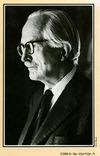Smallbone Deceased
Smallbone Deceased is a British mystery novel by Michael Gilbert, first published in the United Kingdom in 1950 by Hodder and Stoughton and in the United States by Harper & Brothers. A practicing lawyer himself, Gilbert has made the setting of the novel a London solicitor's office. It was Gilbert's fourth novel and, like his three earlier ones, features Chief Inspector Hazlerigg as the official investigator; it also has an unofficial detective who works closely with Hazlerigg, a newly qualified solicitor named Henry Bohun who has just been hired by the firm in which the murders occur. A parainsomniac (a person who needs only a very few hours of sleep per night), Bohun makes this his only appearance in a Gilbert novel but goes on to be the protagonist of a number of short stories.
Reception and/or Appraisal
Margery H. Oates at the New York Times called it "a first-rate job" upon its publication:
When an anonymous corpse is found in a office strong box, when a trustee disappears and a young partner becomes erratic, the... atmosphere becomes tense... The author is a lawyer who looks at the law and the people in it with equal parts of mirth and wisdom. [1]
A much later appraisal comes from Barzun and Taylor's encyclopedic Catalogue of Crime:
Two splendid murders on the premise of a London solicitor. The motives ae good, and one must call excellent the detection by Inspector Hazlerigg and an amateur assistant, who enjoys parainsomnia. As a bonus we are given a method of mortgaging property already fully mortgaged, and a pleasant bit of fooling about the Ascheim-Zondek test and its antecedents. All in all, Gilbert's masterwork.[2]
The Guardian's obituary of Gilbert by H. R. F. Keating described the novel as:
a classic of the genre...rich with everyday details of a law practice, both good and naughty, dancing too with pawky humour; at the same time it sets a puzzle to please the most exigent of readers.[3]
The book was ranked 64th in the The Top 100 Crime Novels of All Time, published in 1990 by the British-based Crime Writers' Association.[4] Five years later, it was ranked 80th in the The Top 100 Mystery Novels of All Time, published by the Mystery Writers of America.[5]
The Telegraph's obituary of Gilbert also praised it as "one of his finest novels".[6]
References
- ↑ Criminals at Large: Office Intrigue, "The New York Times", 5 November 1950 at [1]
- ↑ Jacques Barzun & Wendell Hertig Taylor, A Catalogue of Crime, Harper & Row, New York, "Second Impression Corrected", 1973, page 209
- ↑ Keating, HRF. Obituary: Michael Gilbert, 10 February 2006. Retrieved on 8 May 2016.
- ↑ (1990) The Hatchard's Crime Companion: 100 top Crime novels. London: Hatchard. ISBN 978-0-904-03002-0. OCLC 60057335.
- ↑ The Crown crime companion: the top 100 mystery novels of all time. New York: Crown Trade Paperbacks. ISBN 978-0-517-88115-6. OCLC 31605503.
- ↑ Michael Gilbert, 10 February 2006. Retrieved on 8 May 2016.
